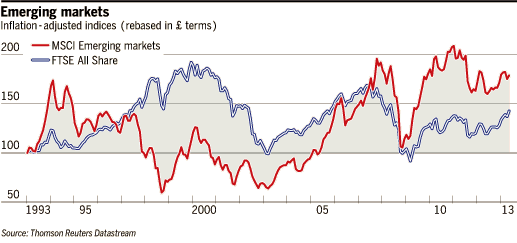Emerging markets Should you or shouldn t you
Post on: 24 Июль, 2015 No Comment

Sometimes, small amounts of dangerous things can be very useful. In small doses, nitroglycerine can help with heart ailments. Large amounts of nitro, though, are nothing but trouble.
Emerging markets small foreign stock markets based in developing countries can also be useful in small doses. But in large quantities, they can leave gaping holes in a portfolio.
Does that mean you shouldn’t have an emerging-markets fund in your portfolio? No. If you do, it should be a tiny part, and there’s no harm in skipping the sector altogether.
It’s true you can make several powerful arguments for investing in emerging markets. The first: Developing countries tend to experience rapid economic growth. And that translates into strong earnings growth for the companies that do business there. Rapid earnings growth, in turn, often means big gains in stock prices.
Consider China, whose gross domestic product soared an estimated 10.5% last year. By contrast, U.S. GDP grew only 3.3%. Not surprisingly, China’s stock market soared, rising 83% in 2006. The Standard & Poor’s 500-stock index, meantime, gained just 15.8% (assuming dividends were reinvested).
Today’s emerging markets also seem more financially stable than they once were. The average emerging-market credit rating is higher than it was 10 to 15 years ago, says John Lonski, chief economist for Moody’s Investors Service.
Why the improvement? Many developing countries have tightened monetary policy and shored up their financial structures. Some have seen their economies buoyed by the global boom in commodity prices. And credit ratings for some European developing nations have risen because they’ve joined the European Union. It’s like a high-yield bond issuer being taken over by a strong company, Lonski says.
Furthermore, you could make the case for investing in emerging markets because of their long-term outlook. It’s where the future of the world is, says Harold Evensky, a Florida financial planner. It’s where most of the world’s resources are and where most of the world’s people are.
Finally, stock prices in emerging markets are not that high, at least in relation to earnings. Alec Young, international equity strategist at S&P, says emerging markets now sell for only about 12.2 times 2007 earnings. The S&P 500, by way of comparison, sells for about 15 times 2007 estimated earnings.
So what’s not to like? Let’s start with the perception that you can invest now in the countries that will lead the world in the future. This may be true. But the lives of nations tend to last longer than the lives of companies. Profiting from the next USA could require a far longer holding period than for the next Microsoft.
And even if you could invest for the very long term, returns from any one emerging market are likely to be more volatile and not necessarily as lucrative as the gains in a developed market. Stock returns from the United States were generally higher in the 20th century than in the 19th century, when the USA was an emerging market, says Bryan Taylor, chief economist for Global Financial Data.
Then there are those meltdowns in emerging markets from time to time. The 9% tumble in the Chinese stock market Tuesday was modest, at least in comparison with the August 1998 implosion in emerging markets. The average diversified emerging-markets fund fell 27.3% that month. One of the hardest-hit emerging-markets fund, ING Russia, plunged 60.6%.
Does the average investor need an emerging-markets fund? No, says Kurt Brouwer, a financial planner in Tiburon, Calif. The average investor probably doesn’t have enough money in foreign developed markets, and that should be the first priority. In addition, some diversified international funds already invest a portion of their assets in emerging-markets funds. So adding a separate emerging-markets fund could overweight your portfolio in the stocks of developing countries.
But say that you’re still intrigued by emerging-markets funds. Fine. Let’s set a few guidelines.
Stay diversified. Unless you’ve got as much insight into the Chinese stock market as someone who lives in China, you have no business investing in a China fund. A single country’s stock market can produce losses that would take decades to recoup.
Make small bets. S&P recommends that just 4% of your overall portfolio and that includes money market funds and bonds be invested in emerging markets. A 5% bet should be enough for most people.
Hang in there. You’ll get the most benefit and the biggest gains if you hold your fund for the long term and add to it when it’s down sharply. Perversely, most investors do the opposite: They invest while emerging markets are hot and sell when they’re not.
So if you must play with emerging markets, be sure to do so in small doses. Craters in your portfolio can be awfully hard to fill back up.
John Waggoner is a personal finance columnist for USA TODAY. His Investing column appears Fridays. Click here for an index of Investing columns. His e-mail is jwaggoner@usatoday.com
Posted 3/2/2007 3:32 AM ET














